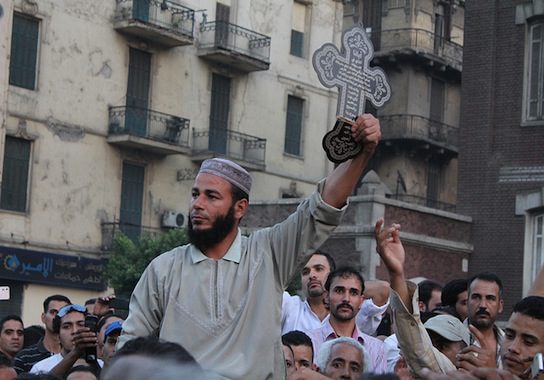Egypt Needs a Political Solution, for the Copts and the Brotherhood

Andrew Doran’s article in National Review last week rightly notes the brutality undergone by the Copts in the aftermath of Egypt’s coup. He even compares the brutality with Nazi persecution of the Jews:
The Muslim Brotherhood’s systematic and coordinated attacks against Christians in Egypt are reminiscent of Kristallnacht in Germany in 1938, when Nazi paramilitaries systematically vandalized Jewish homes, businesses, and synagogues and murdered scores of Jews in a disturbing foreshadowing of the fate of European Jews over the next few years. It is no accident that many Jews, including Barry Rubin and Jeffrey Goldberg, have been quick to raise the alarums over the persecution of Christians: They recognize the dangerous signs. “They have hatred in their hearts,” says Thabet of the Brotherhood, echoing observations commonly made of the National Socialists in 20th-century Germany.
But the Copt’s persecutors are not a well-organized military force, with a charismatic and powerful leader. Rather, they are a hurt and angry mob, with a rapidly dwindling leadership. Their acts of aggression against Coptic Christians seem less a calculated ruthless policy than the raged revenge of a hurt and angry people. Of course, this is not to excuse those horrendous actions. However, it does change the way in which we seek a solution to the problem.
In Egypt, the mob and the military are not unified; rather, their very friction has helped instigate and foster this persecution, more or less. More military crackdown only seems to result in more Coptic persecution. Thus, a foreign military strengthening Egypt’s military arm is not likely to fix the problem. The Muslim Brotherhood’s leadership has been weakened significantly in recent weeks; this, as Eric Trager argued in The New Republic, makes the group even harder to control and direct in a peaceable manner. And this does make sense: without leadership with whom to reason, the group will become more and more unreasonable:
… By disorganizing Egypt’s most cohesive Islamist group, the generals have turned hundreds of thousands of deeply ideological Muslim Brothers into free radicals, who will no longer listen to their typically cautious leaders. Many younger Muslim Brothers, in particular, lean towards Salafism, and their upbringing in the Brotherhood—whose motto concludes with the phrase “death for the sake of Allah is the highest of our aspirations”—has made them willing to die for Islamism, and possibly willing to fight for it as well.
In addition, one cannot exempt the military from blame in Coptic persecution: John Storm, acting Middle East director at Human Rights Watch, said in a statement Thursday that “For weeks, everyone could see these attacks coming, with Muslim Brotherhood members accusing Coptic Christians of a role in [Morsi’s] ouster, but the authorities did little or nothing to prevent them.”
The military does not bring answers to Egypt’s current conflict, then – at least not long-term answers. Some form of representative government must be found to provide succor for the country’s minorities and appeasement to its religious majority. This is not to suggest that Western-style democracy will solve all the country’s problems – to the contrary, as Dan pointed out here, the country must build liberty on its own terms, although this “may involve a degree of ‘bitter compromise’ and ‘balancing illiberal political forces’ that we Americans cannot begin to appreciate.”
It is important to strive to understand Egypt’s Muslim Brotherhood and its members – not to demonize them without attempting to understand why are they so angry. Roger Scruton explained some of their thinking in a BBC article: “The Brotherhood aims for a populist government and won an election that it took to authorize the remaking of Egypt as an Islamic Republic. The posters waved by Morsi’s supporters did not advocate democracy or human rights. They said: ‘All of us are with the Sharia.’ The army replied by saying no, only some of us are.”
The army is right in recognizing that Sharia will not provide answers for the Egyptian people. Shariah does not lend itself well to a modern representative government – as Scruton noted, “When God makes the laws, the laws become as mysterious as God is. When we make the laws, and make them for our purposes, we can be certain what they mean.” But the question then remains for Egyptians, “Who are we, really?” Its Islamist citizens must recognize that the answer may require “bitter compromise” on their part.
Comments